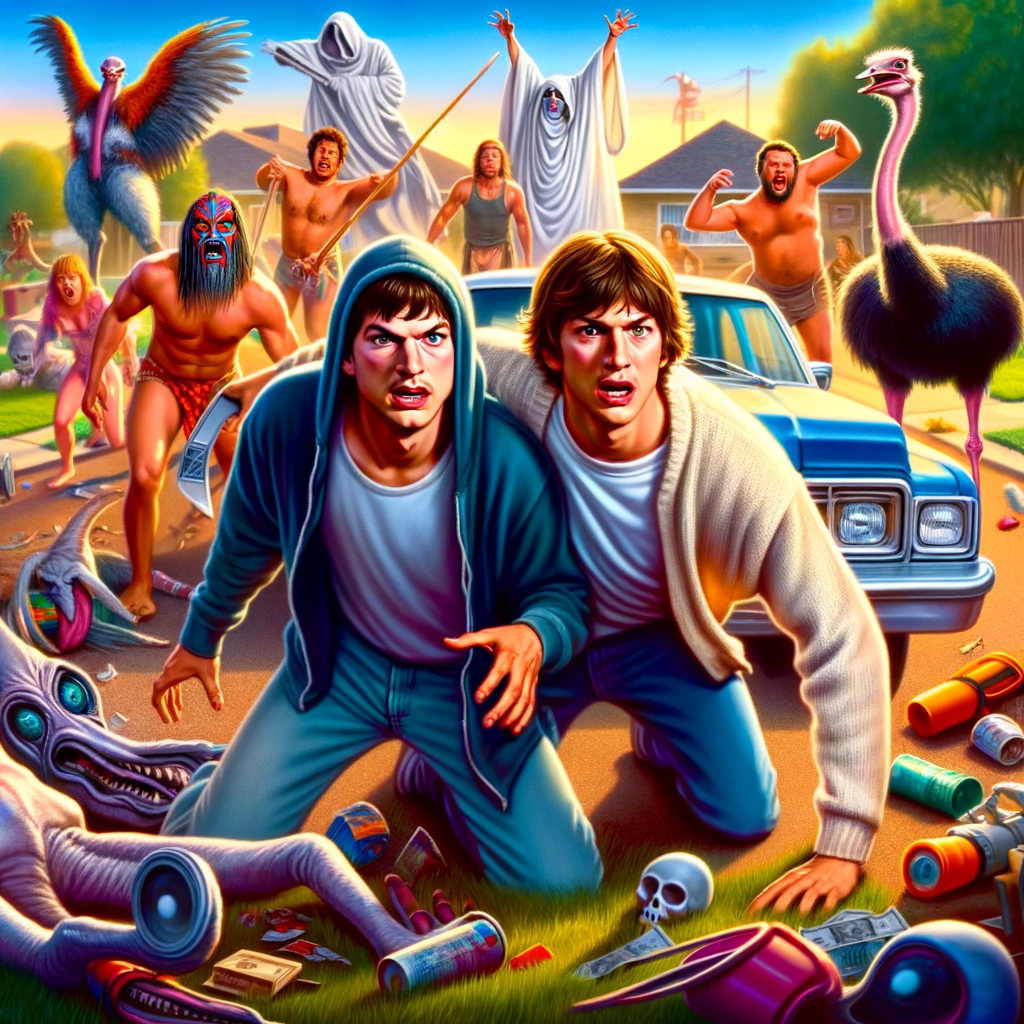
“Dude, Where’s My Car?” is a comedy film that debuted in the year 2000, directed by Danny Leiner. This film quickly cemented itself as a cult classic, particularly admired for its whimsical humor and absurd plot twists. It stars Ashton Kutcher and Seann William Scott as Jesse and Chester, two young men who find themselves in a baffling situation after a night of wild partying: they cannot remember anything from the previous evening, including where they parked their car.
The plot of “Dude, Where’s My Car?” unfolds as a series of comedic misadventures that Jesse and Chester encounter while trying to locate their missing vehicle. Their quest is anything but straightforward, as they stumble upon a continuously escalating series of bizarre and inexplicable events. This includes encounters with a group of angry ostriches, a gang of aggressive bodybuilders, and a cult of alien worshippers—all of whom are somehow linked to the whereabouts of their missing car.
The charm of the film lies in its simple yet engaging premise. It taps into a universal fear—losing something important and having no recollection of how it happened—but addresses it with humor and a light-hearted tone. The narrative’s strength is amplified by the chemistry between Kutcher and Scott, whose characters’ laid-back attitudes and unwavering friendship provide a steady core amidst the chaos surrounding them. Their dialogue, peppered with now-iconic lines like “Dude, where’s my car?” and “Sweet!”, resonates with a specific brand of early 2000s humor that prioritizes fun and levity over logic and substance.
Aside from its main comedic plot, “Dude, Where’s My Car?” also dips into themes of love and responsibility. Jesse and Chester aren’t just on a mission to find their car; they’re also trying to salvage their relationships with their girlfriends, Wanda and Wilma. The film portrays their struggle to prove themselves as dependable partners, adding a layer of emotional depth to the otherwise slapstick comedy. This subplot is crucial as it provides the characters a reason to evolve, albeit subtly, showing that beneath their carefree exteriors lie young men capable of growth and self-reflection.
Critically, “Dude, Where’s My Car?” received mixed reviews. While it was panned by some for its seemingly nonsensical plot and juvenile humor, others praised it precisely for its commitment to a no-holds-barred style of comedy. It’s a film that doesn’t take itself seriously, which is exactly the point. Its absurdity is intentional, serving as a critique of the excesses of youth culture while also celebrating those very excesses. It invites the audience to laugh at the ludicrousness of its situations, making it an enjoyable, if not thought-provoking, cinematic experience.
The film’s influence extends beyond its immediate release. It has been referenced in various media and continues to be a touchstone for discussions about comedies from the early 21st century. Its impact is partly attributed to its role in shaping the careers of its leading actors—Ashton Kutcher and Seann William Scott—who both went on to successful careers in Hollywood. Moreover, “Dude, Where’s My Car?” represents a time capsule of sorts, capturing the zeitgeist of a particular era in American pop culture with its fashion, dialogue, and attitudes.
In terms of its cinematic legacy, “Dude, Where’s My Car?” stands as a quintessential example of early 2000s comedy. It embodies the era’s penchant for lowbrow humor and serves as a reference point for understanding how comedy has evolved since then. As newer generations discover the film, its reception continues to be a mixture of nostalgic appreciation and critical reevaluation. This ongoing dialogue about the film’s merits and its place in the comedy genre underscores its enduring appeal.
Ultimately, “Dude, Where’s My Car?” is more than just a movie about two guys looking for their lost car. It’s a study in how absurdity and simplicity can merge to create a memorable comedy experience. It teaches us that humor doesn’t have to be complicated to be effective, and that sometimes, the silliest stories are the ones that stay with us the longest. Whether viewed as a guilty pleasure or a comedic gem, this film remains a unique artifact of its time, offering laughter and a light-hearted escape into the surreal.
Image inspired by the chaotic and whimsical theme of “Dude, Where’s My Car?”